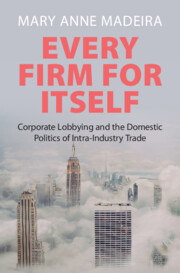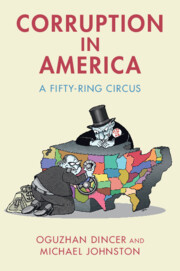Refine search
Actions for selected content:
158 results
4 - The United States and External Property Rights
-
- Book:
- Hierarchy and the State
- Published online:
- 20 August 2025
- Print publication:
- 02 October 2025, pp 65-96
-
- Chapter
- Export citation
Who Stopped the Equal Rights Amendment?
-
- Journal:
- State Politics & Policy Quarterly ,
- Published online by Cambridge University Press:
- 12 September 2025, pp. 1-25
-
- Article
-
- You have access
- Open access
- HTML
- Export citation
Qui devrait légalement être considéré comme lobbyiste au Québec ?
-
- Journal:
- Canadian Journal of Political Science/Revue canadienne de science politique / Accepted manuscript
- Published online by Cambridge University Press:
- 09 September 2025, pp. 1-13
-
- Article
- Export citation
7 - The Politics of TPP and TTIP in the United States
-
- Book:
- Every Firm for Itself
- Published online:
- 21 July 2025
- Print publication:
- 07 August 2025, pp 139-169
-
- Chapter
- Export citation
5 - Lobbying over Trade Policy in the European Union
-
- Book:
- Every Firm for Itself
- Published online:
- 21 July 2025
- Print publication:
- 07 August 2025, pp 87-115
-
- Chapter
- Export citation
4 - Cleavage and Coalition in US Trade Politics
-
- Book:
- Every Firm for Itself
- Published online:
- 21 July 2025
- Print publication:
- 07 August 2025, pp 60-86
-
- Chapter
- Export citation
1 - Introduction
-
- Book:
- Every Firm for Itself
- Published online:
- 21 July 2025
- Print publication:
- 07 August 2025, pp 1-13
-
- Chapter
-
- You have access
- Export citation
Principled Pragmatism: Big Business and Campaign Contributions After January 6
-
- Journal:
- British Journal of Political Science / Volume 55 / 2025
- Published online by Cambridge University Press:
- 01 August 2025, e100
-
- Article
-
- You have access
- Open access
- HTML
- Export citation
Introduction
-
- Book:
- Spinning the World
- Published online:
- 03 July 2025
- Print publication:
- 24 July 2025, pp 1-18
-
- Chapter
- Export citation

Every Firm for Itself
- Corporate Lobbying and the Domestic Politics of Intra-Industry Trade
-
- Published online:
- 21 July 2025
- Print publication:
- 07 August 2025
An experimental investigation of lobbying and bribes
-
- Journal:
- Experimental Economics ,
- Published online by Cambridge University Press:
- 10 April 2025, pp. 1-13
-
- Article
-
- You have access
- Open access
- HTML
- Export citation
4 - European Distinctions between Private and Public Law in Health Care and the Emerging Influence of Private Lobbies
- from Part I - What Is Private Law?
-
-
- Book:
- Health Law as Private Law
- Published online:
- 16 March 2025
- Print publication:
- 27 March 2025, pp 44-56
-
- Chapter
-
- You have access
- Open access
- HTML
- Export citation

Corruption in America
- A Fifty-Ring Circus
-
- Published online:
- 21 March 2025
- Print publication:
- 03 April 2025
Dissertation abstract: The experimental analysis of the political economics of fisheries governance
-
- Journal:
- Experimental Economics / Volume 10 / Issue 2 / June 2007
- Published online by Cambridge University Press:
- 14 March 2025, pp. 181-182
-
- Article
- Export citation
Lawsuit as Lobbying: Understanding Same Sex Marriage and Other Constitutional Litigation in Japan
-
- Journal:
- Asia-Pacific Journal / Volume 22 / Issue 2 / February 2024
- Published online by Cambridge University Press:
- 14 March 2025, e1
-
- Article
-
- You have access
- Open access
- Export citation
4 - Second Prize Is a Set of Steak Knives
-
- Book:
- Dominance Through Division
- Published online:
- 01 March 2025
- Print publication:
- 06 March 2025, pp 108-136
-
- Chapter
- Export citation
6 - How Politicians Tie Money to Electoral Support
-
- Book:
- Dominance Through Division
- Published online:
- 01 March 2025
- Print publication:
- 06 March 2025, pp 173-232
-
- Chapter
- Export citation
5 - Property
- from Part II - A Tale of Three Cities
-
- Book:
- The Authoritarian Commons
- Published online:
- 21 December 2024
- Print publication:
- 09 January 2025, pp 61-82
-
- Chapter
- Export citation
On the Proposed Measures to Regulate Third Country Interest Representation Activities in the European Union
-
- Journal:
- European Journal of Risk Regulation / Volume 16 / Issue 2 / June 2025
- Published online by Cambridge University Press:
- 04 December 2024, pp. 591-602
-
- Article
-
- You have access
- Open access
- HTML
- Export citation
Identifying and developing the roles of private business actors in international regime complexes
-
- Journal:
- Business and Politics / Volume 27 / Issue 2 / June 2025
- Published online by Cambridge University Press:
- 05 November 2024, pp. 216-233
-
- Article
-
- You have access
- Open access
- HTML
- Export citation
